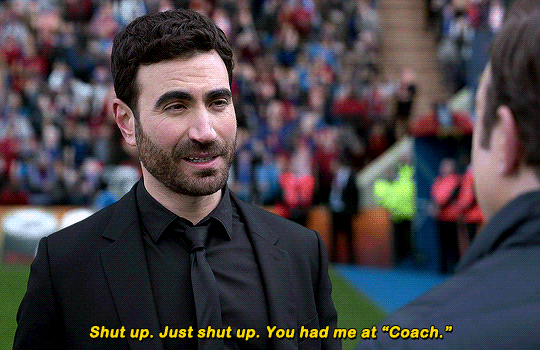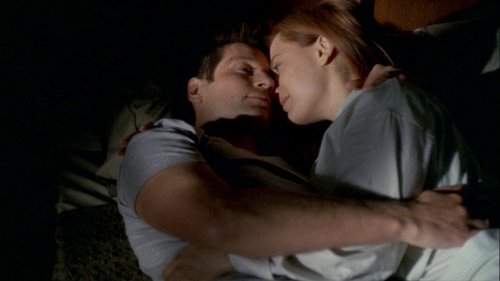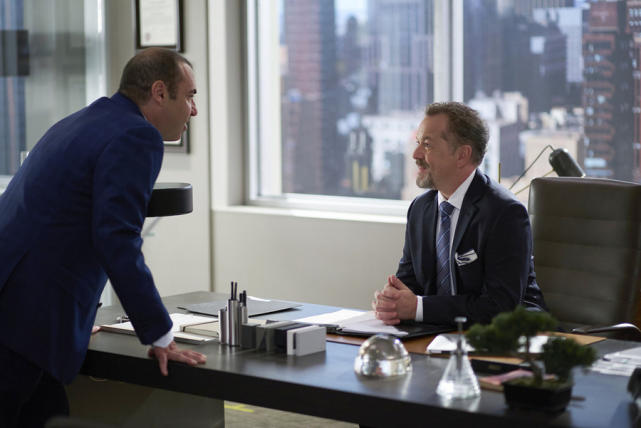Shipper: short for relationshipper; one who believes there is, was, should, and could be a relationship between two characters in a certain fandom.
IN THE BEGINNING...
The definition above is mostly, for the uninitiated. I’m not even sure there’s a person online right now who needs the term "shipping" described to them, but I decided to play it safe and include it anyway. After all, my mom could be reading this article. And she would probably need the definition.
But the rest of us… we’re clear. We know what shipping is. We’ve probably actively engaged in shipping (or currently "engage," present tense, whatever). We’ve discussed the merits of one ship over another; we’ve written fanfic, created GIF sets, analyzed every little word and/or touch to distraction, and written thousands of words about character motives. And we’ve probably even told our friends -- or maybe our editors -- that they’re wrong to ship a certain pairing (Jenn, I still love you, but Harry/Hermione?!).
Shipping is a part of life. Well, it's a part of fandom life, at least. And something pretty great is that shipping not a rational thing: we don’t always ship two people because the writing is dictating that they become a couple, though that’s a reason. Sometimes, honestly, we ship two characters because of the chemistry. Other times, it’s just purely for the sake of aesthetics – we want the pretty people to get together,
dang it! We may even ship two characters because their interactions speak to a part of ourselves and our lives that we keep hidden from the rest of the world.
The point is, there are many reasons to ship one couple or another. I’m not here to discuss, in-depth, those particular reasons or my own preference of ships. I have mine (many, many ships... too many to count, really but
hit me up on Twitter if you want to know) and you have yours. You probably won’t change your mind about your ships, and I won’t change mine. And, actually, that doesn’t even really matter.
What matters is this: this whole shipping phenomenon, as we know, it started a little over twenty years ago, because of David Duchovny, Gillian Anderson and a purposely vague relationship between the male and female leads of
The X-Files.
The rest, as they say, is TV history.
Now, this isn't to say that Mulder and Scully were the original ship. They were not the first time people looked at two people and said: "I want THOSE two to get together." People have been shipping characters for as long as there have been books, TV, and movies. Heck, I would not be surprised if people shipped Romeo and Juliet in Shakespeare's day. But the actual term and the frenzy associated with it? Well – you can thank fans of
The X-Files for that.
ANCIENT HISTORY
In the old days of usenet groups and modems, when fanfiction.net and Tumblr were still pipe dreams,
X-Files fans were divided in two groups: those who wanted Mulder and Scully to get together (a.k.a, the relationshippers) and those who wanted the relationship to remain platonic (a.k.a. the noromos). One of those terms stuck, the other one… well, the other one went the way of their desires.
Since this is the Internet, of course, and the word relationshippers is far too long of a word to use in normal conversation, the term was pretty quickly thereafter shortened just to "shippers."
How’s that for an ancient history lesson?
Even during the show’s run, however, the term "shipping" was rarely talked about outside of specific fan circles (namely, nerds on the Internet). Yes, there was media coverage focused on the fans who liked the idea of the couple getting together, but that coverage was never as widespread as it is today.
It’s not that people were less passionate about shipping back in the day though, lest you think that – they just had less of an opportunity to connect with the people behind the show and actually affect outcomes. Think of Mulder/Scully as the little ship that could – the relationship that developed despite the creator's best intentions (you can’t rewrite history now, Chris Carter, we know), and despite the fact that, for at least half of its run, the shippers weren’t even that vocal. In fact, for the inevitability of a Mulder/Scully romance I see in retrospect, watching live I was often convinced that it was never,
ever going to happen.
(... Did it happen? Did I dream it? Are Mulder and Scully together right now?)
For me, shipping started with these two characters. I’ve evolved now, of course. I ship just about everything there is. But there was a time I didn't. And I spent much of my teenage years obsessing over gestures between Mulder and Scully and/or hoping for at least a hug between the two. And I wasn’t the only one, obviously. So what was it about them, you ask? (If you’ve never seen the show, this is a valid question. If you have, then… are you a noromo?) What was it about Mulder and Scully as characters and as a ship that drew such a passionate fanbase that we’re all
still here -- talking about them -- twenty-two years after the pilot first aired?
Okay, I’m going to try my best to answer you. I really am. It’s probably going to take a lot of words in order to do so, because, well… the show lasted for eight eight seasons (technically nine, but we all try to ignore season nine), and there’s a lot to analyze. Too much, maybe.
And it started right from the pilot episode.
A LITTLE BIT OF CHEMISTRY GOES A LONG WAY
Chemistry between actors is a funny and an inexplicable thing. Sometimes the spark is there, sometimes it isn’t (and sometimes shows attempt to force chemistry out of two actors who don't, but that's another case altogether). And boy, do David Duchovny and Gillian Anderson have chemistry. They have so much chemistry, in fact, that sometimes I find myself wondering about if that chemistry translated to real life or originated there. As Mulder and Scully, though, the spark and sizzle was readily apparent from day one.
In fact, it was so apparent that before there were real signs of the ship in the writing itself, Chris Carter was already answering questions about the possibility of romance between the two leads. In an interview published before "Ghost in the Machine" (literally THE FIFTH EPISODE OF THE FIRST SEASON) aired, the show’s creator gave this response to a question about the nature of Mulder and Scully’s relationship.
“No, it’s a relationship that is much stronger and more passionate. First of all I would call it a cerebral romance, in that these characters sort of delight in each other’s approaches and it isn’t the pat or standard or expected television romance between them. There is no physicality between them. I don’t see it in the near future here. They don’t end up in the sack together. At least I don’t see it happening yet. I think it’s refreshing. I mean I was raised on shows like The Avengers which are smart and the characters were very attractive for those aspects. They didn’t have to end up in bed together.”
We should have known just by how defensive Chris Carter got (and by the fact that he felt compelled to deny the possibility of a romantic relationship three times in one paragraph) that he didn’t really understand what was happening between the two leads on his own show. (No physicality, Carter? What’s with the whole Mulder straightening out Scully’s necklace in episode three?!). But we’re not here to talk about Chris Carter and what he did or didn’t understand about the romantic relationship between Mulder and Scully.
We already had that chat. We’re here to talk about what
we saw, not what he saw.
(Hint: we saw plenty)
From the very beginning, the whole set-up of the series felt like a slow-burn couple with a clear endgame in sight. After all, Mulder and Scully were, in the early days of
The X-Files, the only two characters you saw episode in and episode out. Have you heard the phrase “it’s you and me against the world”? Well, it WAS Mulder and Scully against the world.
And what a world it was.
A strange, strange world where unexplained was the norm, where evidence disappeared, where you were expected to report on your partner. A world where you’re given a job that -- just by accepting it -- would make you a pariah. A world where you’re the only one who can see the truth, and are ridiculed for it.
So, it was only natural that these two people would develop chemistry, that we would be drawn to them as viewers and invested in their relationship. When there’s no evidence of the crazy stuff you’ve seen, the only person who’ll believe you’ve seen some crazy stuff... is the person who was there
with you for it. And yes, the show took Scully’s skepticism to extremes sometimes, mainly by having her conveniently “miss” most of the moments that would have proven Mulder right. But in general, Scully was always there for the weird and for the unexplained. She just usually managed to have a rational explanation for it.
This is the beginning, the basis for everything in their relationship. You have this person, this one person who’s there with you – there
for you, and you sort of end up trusting that person by default. And then that trust is put to the test. (See "Ice" and "Darkness Falls" just in season one alone). And after a while, it’s not that you trust them because they’re there, and it’s easy. You trust them because they’ve proven themselves to you. That person has become your friend, your confidant – your
partner.
THE EVOLUTION OF A SHIP
Early on in the show, we see Scully attempting to maintain a normal life outside of work. If we hadn’t, we might have -- as an audience -- wondered about her or have been concerned for her. Mulder was wholly devoted to his work from the start, for many, many reasons. He’d given up the pretense of a life outside of it. Scully, however, had to
choose to join him on his quest. And join him she did – to the detriment of most of the relationships in her life.
There’s a moment in the season one episode
"Jersey Devil" where Scully turns down a date to join Mulder in an investigation. He teases her about having a life, but it’s clear from that instance early on that Scully is choosing to make
Mulder her life. She’s not choosing the quest, but
him. She’s following him.
(Now read that line three times and tell me you don’t ship them.)
At the end of season one, after time spent fighting against the system all by themselves, our heroes are put in the stereotypical season-finale cliffhanger of being separated from one another. The X-Files are terminated, and Mulder and Scully must go their own ways. And I promise you that if you somehow made it through an
X-Files initial watch (or re-watch) without somehow shipping Mulder and Scully, the premiere of season two is the moment you would start.
Because Mulder is depressed in that premiere. He has no evidence to back any of his claims. And, look, that doesn’t seem like a big deal. But understand this – HE’S NEVER HAD EVIDENCE.
That has never really bothered him before. He was that lonely guy screaming at the sky before Scully. Now he’s better. He’s grown. He might not have all the answers, but at least now, thanks to the woman The Powers that Be assigned to debunk him, he’s asking the right questions.
And Scully’s grown, too. She’s the one to encourage Mulder not to give up. He’s expanded her world, just as she provided a foundation for his.
(Crying? Nah, I’m not crying. I just have a little something in my eye.)
And to think I've written this entire article and haven’t even gone into Scully’s abduction, Mulder’s rage, Mulder wearing her cross necklace for the entirety of that horrible episode where she was missing, Mulder’s rage
again, when she returned, Scully’s family being all like: "we know you’re in love with her, dude," and that little moment when Mulder decides being with Scully is more important than revenge. We haven’t even talked about any of that yet, you guys.
And we won’t, mostly because we need to talk about something even more important that’s not often discussed. Mulder’s entire reason for – well, for
everything, is his sister, Samantha. Samantha was abducted when he was 12 years old, and he not only blames himself for it, but dedicates his life to figuring out what happened. To finding her.
... ONLY TO TRADE HER LIFE FOR SCULLY’S WITHOUT A SECOND THOUGHT.
(And, yes, fine, that wasn’t the
real Samantha, just clone Samantha. But he didn’t know that. Mulder really thought he was giving up his long-lost sister. Remember when you asked me, like a thousand words ago, why I shipped them? THIS IS EVIDENCE OF WHY.)
As an aside, just for those uninitiated into
The X-Files, I’m not even up to the end of season three here.
There’s more of this throughout the series -- more of the same, and more of different ways to show love. I’m not here to do a play-by-play of all the Mulder/Scully moments for you, though. (For the record, I totally would be, but this has already taken many more words than I planned). I’m merely here to give you a glimpse into what made these two idiots the couple to ship back in the 90’s. I'm here to explain to you what made people who never watched the show when it originally aired be as invested in their relationship as I was when I was a teenager.
I'm here to explain to you what made Mulder/Scully the jump-off point for this crazy, beautiful, wonderful phenomenon called shipping. (And I hope I managed to do that.)
Because they
were the starting point, there’s no doubt about it. Do you love a couple on TV today? Have you ever fallen in love with a fictional character’s love story? Do you enjoy fanfiction, the GIF sets, even the debates and meta commentary? Then take a moment to thank Mulder and Scully. Or, better yet, go watch them and THEN thank them.
The original ship always has room for one more member.
The X-Files returns with six new episodes beginning January 24th, 2016 on FOX.
































